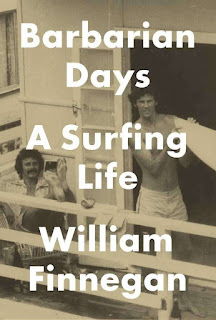Finnegan, a staff writer for The New Yorker and a contributor to other periodicals, has reported primarily on international conflicts and inequalities. In Barbarian Days, he examines with honesty and insight his passion for surfing. He has ridden some of the world's biggest waves--in California, Hawaii, the South Pacific islands, Australia, Indonesia, Asia, and Africa. Surfing is the constant as Finnegan moves down the line of his life, informing his development as a writer, a political thinker, a friend, a husband, and a father. After some of his initial, formative surfing experiences, he compares himself to Pip in Moby Dick, the cabin boy who jumps overboard and is rescued but has seen "God's foot upon the treadle of the loom, and spoke it; and therefore his shipmates called him mad." This allusion evokes the themes of this great American novel, themes Finnegan also explores by examining his own life: duty and defiance, relationship and isolation, justice and inequality. Surfing, he says,
always had this horizon, this fear line, that made it different from other things, certainly from other sports I knew. You could do it with friends, but when the waves got big, or you got into trouble, there never seemed to be anyone around. Everything out there was disturbingly interlaced with everything else. Waves were the playing field. They were the goal. They were your adversary, your nemesis, even your mortal enemy. The surf was your refuge, your happy hiding place, but it was also a hostile wilderness--a dynamic, indifferent world. At thirteen, I had mostly stopped believing in God, but that was a new development, and it had left a hole in my world, a feeling that I'd been abandoned. The ocean was like an uncaring God, endlessly dangerous, power beyond measure. And yet you were expected, even as a kid, to take its measure every day. You were required--this was essential, a matter of survival--to know your limits, both physical and emotional. But how could you know your limits unless you tested them? And if you failed the test?The young Finnegan sees in the best surfers on their best rides "long moments of grace under pressure that felt etched deep in my being: what I wanted, somehow, more than anything else."
What do you think? Do you have a long and complicated relationship with a dangerous activity? Why do you do it? What has it taught you about life? How did surfing open Finnegan's eyes to the world around him, especially its inequalities? Is there a correspondence between Finnegan's work as a war correspondent and his surfing? How does his relationship with surfing change over the years--physically, intellectually, ethically, spiritually? In the final pages of the book, Finnegan describes one of his last, manic days surfing Tavarua as an adult in what is perhaps another allusion to Moby Dick, to Ishmael's friendship with Queequeg. Inia, one of the boatmen who ferry Finnegan out to the waves, takes Finnegan under his care after a wave leaves him stunned and coughing blood. Inia is both a practical master of local wave knowledge and a lay preacher. He invites Finnegan to rely on his judgement, and he asks him directly about his trust in God's love. What does Finnegan learn from this encounter? How does Finnegan resolve his relationship with the fear line of his life? Does he find what he's been looking for?
We hope you will join the discussion: Tuesday, March 1, at 6:30 p.m. at Main Library; Thursday, March 17, at 11:00 a.m. at West Ashley Branch Library; and here on the blog.


No comments:
Post a Comment
For reference, informational, or circulation questions or comments, please use our Ask-A-Question and Catalog Questions services at www.ccpl.org.